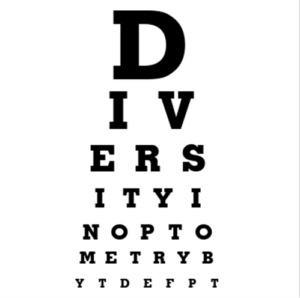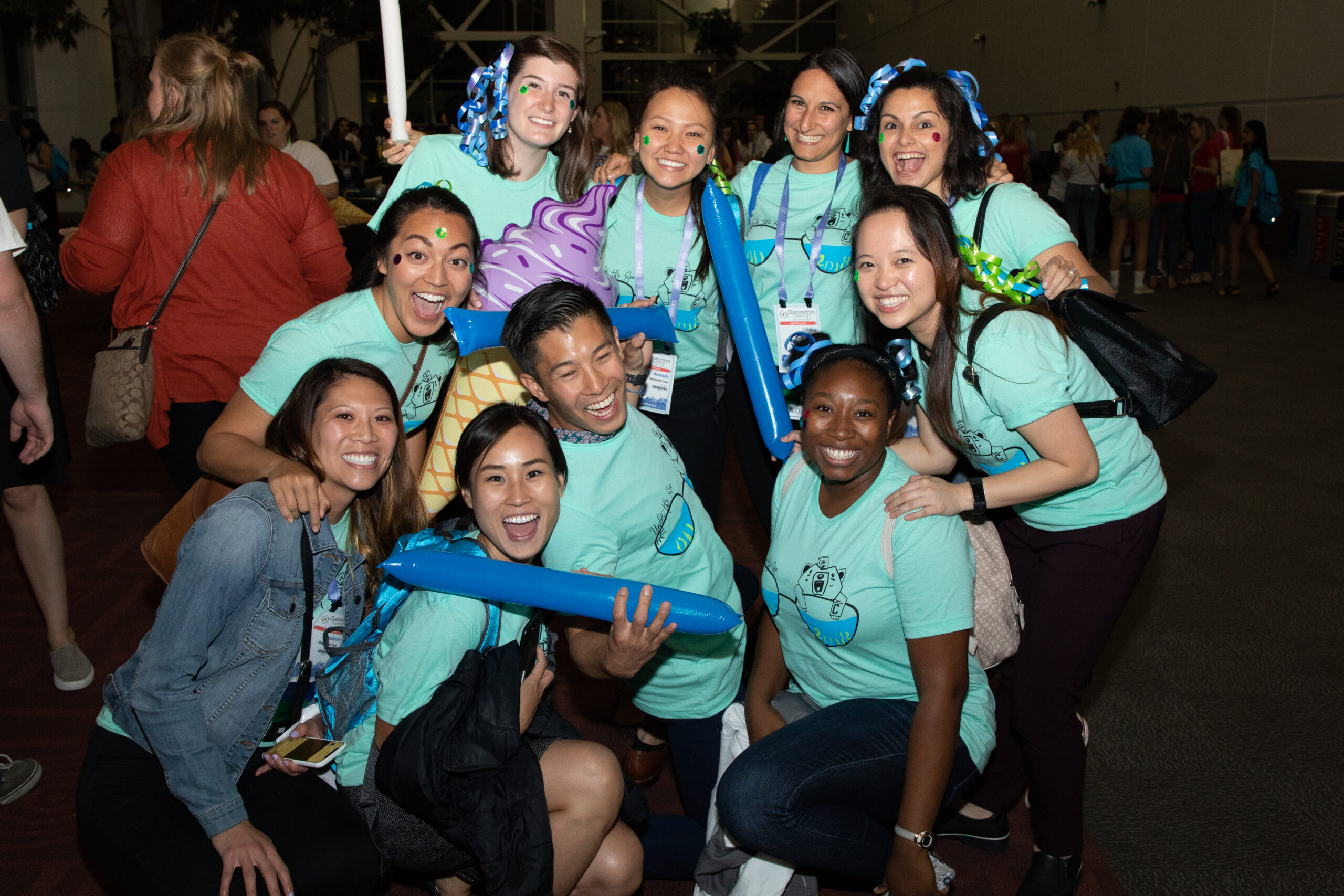Author: Kirsten Ellis
Expectations vs Reality – Starting Optometry School During a Pandemic
In August of 2019, if you asked me what I expected my four years of optometry school to look like, I probably would’ve answered something along the lines of “studying all the time,” “constantly stressed,” or “finally learning specifics about a subject that interests me.” Now that I am two years into school and on the verge of seeing my first patient (AH!), all these expectations have been true to a certain extent. However, what I didn’t expect from optometry school was to thrive under such extreme pressure with the best community of people I’ve ever met.
Like many others, March of 2020 threw a gigantic unforeseen wrench into most of my plans. Spoiler alert: what was supposed to be a two-week quarantine turned into more than two years. In August of 2020, the start of optometry school looked vastly different than I envisioned. Lab groups were limited to 15 individuals, two of which were my roommates, whom I met for the first time on move-in day to an apartment I had never seen before. We received our white coats from a folding table in the lobby in intervals to prevent us from getting within six feet of each other. In our labs, everyone was fully masked, and students were sent home to watch our professors lecture from a screen in our respective rooms. Club meetings looked more like webinars, in which you could submit questions, but everyone was generally too nervous to do so.
When I look back and reflect, this time was one of the strangest in my life. During a roughly four-month period, I knew only 15 people in my entire class. Not only this, but I also had not even seen what 13 of their faces looked like from the eyes down. The days looked like an unending loop of lectures and lab with almost zero social interaction or extracurricular activities. For an entire semester all I did was study, practice, study, practice and study some more. While my grades had never looked better, I was craving the ability to be immersed in the learning environment and do some of the fun events that go along with the stress of learning.
While that was a strange and stressful time in my life, there was a light at the end of the tunnel. As the summer before my second year came around, we received news that classes would be available in the coveted “in-person lecture” option! Clubs could even meet in person (with food)! Finally, a year into school, the full optometry experience was available. I was able to sit in a lecture hall with 130 of my classmates, still fully masked of course, learning the same content in the same place. As simple as this sounds, we forget about the joy those 10-minute breaks between classes gives you when you can joke around with your friends. This was the first time I was able to see most of my classmates’ lower half of their face as we ate lunch. I was shocked to realize that I had unintentionally already filled in the lower half of their face and was completely wrong!
This summer period was the time I can remember the possibilities really opening for my optometric education. Two years into school, I have now had the previously unattainable privilege to meet and interact with most of my classmates, network with some very wise doctors at various club meetings, and shadow older students in the clinic. What began as a period of isolation and fear of the future has become a wide-open space of endless possibilities. And to top it all off, on May 15 of 2022, I was ceremoniously handed my white coat (that is stained with coffee, ink and sodium fluorescence since I’ve been wearing it for two years now) and headed off to examine my first patient the very next day.
Starting optometry school amid a global pandemic has come with some challenges to say the least, but I wouldn’t trade a second of it for anything. The past two years have allowed me to appreciate the immense privilege I’ve been granted to be learning about a field I adore and implementing that knowledge surrounded by some of the best people I’ve ever had the privilege of knowing. School is hard. Life is hard. But overcoming challenges has only made us stronger, more present and prepared to tackle anything that comes our way.
Ways You Can Be an Advocate for Optometry
Sydney Mathias, IUSO, Class of 2024
As we all know, optometry is a legislated profession, meaning that state and federal law decide the scope of practice in each state. While this may make optometrists and students feel like it is out of our hands, this is far from the truth. Here are some simple ways that we can make a difference for the future of our profession.
• Stay informed. How will we be able to move optometry forward if we don’t know where we currently stand? Because the scope of practice differs state by state, it is important to stay updated on what is going on in your state of practice. Regularly check up on aoa.org/news and here on theaosa.org.
• Donate to AOA-PAC. It is the only political action committee working to elect and reelect pro-optometry candidates to the U.S. Senate and House of Representatives, allowing us to support the lawmakers who support us. Candidates who back optometry in a position of power are absolutely essential to our profession. Even the smallest donation from every student who reads this article can make a world of difference. Consider donating today!
• Attend Optometry’s Meeting®. One of the best ways to spark your interest and motivation in advocacy is to listen to others who are passionate. At Optometry’s Meeting, there are many opportunities to learn from optometrists and others who have experience in speaking out against injustices or inequalities in the profession. The meeting will be in Washington, D.C., in 2023; follow your local chapters on social media and @theaosa on Instagram so you can be ready when registration opens!
You belong
Catherine Liu, ICO, Class of 2025
Dear future optometrist,
How are you doing? You hanging in there?
Maybe you’re a pre-optometry student still working on your prerequisites in college and worrying about that pesky OAT, wondering if you’ll be able to make it into optometry school. Maybe you’re an incoming first year about to start optometry school and you’re so excited but also so nervous because you know how rigorous it’s going to be. Maybe you’re about to start year two, ready to dive deeper into what you’ve learned but already stressed remembering how hard first year was. Maybe you’re in the swing of year three, navigating the responsibilities of patient care and preparing your battle plan for NBEO Part One in less than a year. Maybe you’re finally in your fourth year externships, amazed at how far you’ve come but still feeling anxious about what’s ahead.
We’re all at different points in our journeys to becoming optometrists, and none of our paths look exactly the same because we’ve all had our own unique experiences that have led us to where we are today. Maybe you took a gap year—maybe even a few. Maybe you went into school straight from college. However you got here, just know that YOU BELONG, and I’m also here to tell you to give yourself more credit for where you’re at today. Because let’s face it: what we’re doing is not easy, but it’s so important.
According to the CDC, about 12 million people in the United States over the age of 40 have some form of vision impairment, with 25.3% of children from the ages of 2 to 17 already wearing some form of vision correction (as of 2019). By 2050, it’s expected that almost 9 million adults over 40 will suffer from vision impairment that cannot be corrected due to various diseases, including diabetes—a disease that about 1 in 10 Americans have. The CDC also claims that almost 100 million adults in the U.S. are at high risk for serious vision loss, including blindness—but only about half of that population has visited an eye doctor in the past year.
And you are joining the profession that gets to help all of these people. How cool is that?
With so many communities in the United States designated as Medically Underserved Areas, you are answering the call by purposefully pursuing more education in order to provide desperately needed vision care to people all across the country. You chose to sacrifice at least four more years of your life, take on an unholy amount of student debt and study for countless hours in order to make your difference in this world by allowing people to see all that it has to offer. You learn not only everything there is to know about eyeballs but also all about systemic physiology, pathology and pharmacology so that you can care for your patients holistically and make a true impact on their overall health and well-being. To be able to do what we aspire to do and make an immediate improvement in the quality of life of our patients is a gift, and you should give yourself some credit for choosing this path in life.
So really, going to optometry school shouldn’t even be thought of as a “sacrifice,” because it is truly an honor and privilege to get to do what we do. It is so important to keep this in perspective, because with all of the long days and nights of studying and stressing, it can sometimes be easy to wonder if it’s going to be worth it. But you are relentlessly putting in the work and persevering through some of the most trying times in your life, and that is perhaps one of the most courageous things that you can do. And let’s not forget: you’re doing all of this in spite of a worldwide pandemic! I mean, come on, how brave is that?
It’s not easy. Nobody said it was going to be easy. But you’re doing it anyway, and you are going to walk out into this world after earning those coveted two letters after your name with not only the knowledge base and skill set but also the confidence and intrinsic drive to make it a better place. You belong in this profession, and if you haven’t taken some time to celebrate yourself in a while, I encourage you to do so because you deserve it!
So to all my future optometrists out there…
I see you. And you’re doing amazing. Keep it up.
Sincerely,
Another future optometrist
How to Survive in Optometry School
Vaishnavi Narain, IAUPR, Class of 2024
One of the biggest challenges optometry students face is finding the time to relax and unwind. Tackling exams every week, attending lectures all day, and squeezing in as much clinic practice as we can leaves little room for much needed R&R.
Just like the developmental stages in life, the first year is the most critical. After starting my first year of optometry school, I quickly realized that there was a huge learning curve between undergrad and a doctorate program. It’s easy to get overwhelmed during the first year—the magnitude of the information you must understand is no joke! The first semester was a challenge for me because I thought I needed to spend every waking hour of my day studying or reviewing notes from the previous class. Finding time to exercise or even take a break to stretch was a seemingly impossible task at the time. Rather than feeling accomplished at the end of a long day of studying, I felt exhausted and burnt out.
Thankfully, with the support and encouragement of a friend, I began giving myself breaks between studying to take short evening walks. After just a quick 30-minute walk, I felt more energized and motivated. Adopting exercise into my daily routine drastically changed my attitude about how to succeed in optometry school. To be able to handle the rigor of an intense graduate program, you need to be able to nourish your body’s needs with exercise and good nutrition. Even replacing your third or fourth cup of coffee with water is a healthy place to start! Making conscious health decisions, no matter how small, can do wonders for your ability to succeed as a student.
Part of our journey as optometry students is learning how to balance our hectic academic lives with healthy lifestyle choices. Even though it seems like 24 hours are not enough to accomplish whatever we need to, making healthy decisions boils down to prioritization and time management. If I take a 30-minute walk before I sit down to study, will I feel better? For me, the answer was a definitive yes. On days when I can afford to break a heavier sweat, I find that I’m even more alert and motivated to work through my endless to-do list of school and non- academic-related tasks. Allowing myself to take breaks and get fresh air has done wonders for my mental health as a student. By making exercise a priority, I am a happier person overall.
Now, the question is: what healthy choices will you make?
The Grace to Learn
Rachel Ryan, ICO, Class of 2024
Student doctors often find themselves placed in uncomfortable situations in clinic. That all too familiar panicked feeling of seeing something unknown during an exam and having a waiting attending to report back to. Of course, they are there to help us and increases our knowledge in any way they can. But, it is only natural for predisposed perfectionists to want all the answers right now. Restrained by the limitations of our current knowledge base, we yearn to be able to help our patients and provide the best care possible. Unfortunately, the curse of optometric expertise is paid in sleepless nights studying, self-inflicted symptoms of dry eye, and lots and lots of experience in clinic. This only comes with time. And even still, there remains endless knowledge to be obtained.
It is daunting being at the foot of this mountain of eye-related things we have yet to conquer. By breaking it down step-by-step, our goal of climbing that mountain and becoming the doctors we want to be will hopefully become more tangible. After all, there are plenty of former student doctors who experienced all of the same feelings of frustration and fear that we have in optometry school. If they can become successful optometrists, why not us? It is so tempting to fall into the egotistical trap of acting like we do not need any help. This attitude, however, will not help any of our future patients. We must take each patient encounter as a learning experience to become better and give ourselves the grace to learn. By pushing ourselves to shamelessly ask questions in clinic and be surrounded by more knowledgeable people, we will slowly become knowledgeable ourselves. Then one day, maybe we will have student doctors looking up to us.
Advice Going into OD 1
To those students going into OD 1, here are some words of advice, study tips and recommendations to help you transition into optometry school. Print this note and keep it nearby as a reference as you prepare for this new chapter of your life. Reach out to those of us just ahead of you. We’re all in this together!
Words from Current Students:
- Be active in your education. Be organized, be on time and pay attention!
- Don’t skip class. You will fall behind.
- Be kind to your classmates. You’re all in the same boat trying to accomplish the same goal.
- You have a whole community of support, so always ask for help and never be afraid to ask for guidance.
- Find your routine and stick with it. Routine with study time, exercise, and social life.
- Stay true to yourself. Everyone will struggle but no one has your experiences, your character, and your story. Use it to your advantage because it has led you this far.
- Time management is IMPORTANT.
- Utilize people and resources.
- Comparing yourself to others is inevitable but absolutely unproductive.
- Learn how to take notes properly and effectively.
- Study daily and effectively.
- Have coping mechanisms ready for your stress. Find ways to de-stress daily to reset your mind.
- Take everything day by day.
STUDY TIPS
- Study on nights you don’t think you need to.
- Repetition and handwriting annotation on Power Points can be helpful.
- DO NOT PROCRASTINATE. Study daily & ask questions!
- Your study style might change from what you did in undergrad.
- Do what is best for you – it doesn’t have to be the way everyone else studies.
- Go over the material at LEAST three times. Quiz yourself off each slide without looking. Anki is a great tool.
- Make a schedule for yourself. Keep yourself accountable and give yourself breaks!
- Passion Planner helped me schedule everything out by half hour increments!
- Use active recall/retention methods like brain dumping, blank charts/tables, making your own practice tests, and so many others.
- 48-hour period! Review a new lecture within the 48-hour period to solidify what you learned in class.
- Don’t neglect your sleep!
- Stay up to date on studying! Do a little bit each day for each subject!
TRANSITIONING INTO OPTOMETRY SCHOOL
- Know what your stress relievers are & make time for them in your schedule.
- Find a group of friends and create a support system of people who are going through the same thing you are.
- Move in early, especially if it is a new city. Take time to fully move in, get acquainted to your new surroundings, and establish a routine before you start!
- Know that we are all overwhelmed and it is normal. Make friends and try to talk to everyone. It feels good to know so many others are in the same boat, and you aren’t alone.
- Be organized with planner and calendars.
- Lean into family support, friends, and maintain hobbies.
- Learn what your strengths and weaknesses are academically. Be able to analyze your own self and use resources!
- A good group of friends can help keep you on track, hold you accountable, and keep you sane when things feel overwhelming.
RECOMMENDATIONS
- Get an iPad with notability.
- Get involved! Four years will fly by, so explore your school clubs, volunteer, and go to conferences whenever you can!
- Don’t be afraid to lean on your classmates whether asking them for help or practicing clinical skills.
- Recognize the importance of understanding concepts and not just memorizing. Everything comes back so understanding the material will always help you in the long run.
- Remember why you started and where you want to be in four years. Never give up!
- Make condensed study guides for each exam. Practice your clinical skills as often as possible!
- Always go to exam reviews. Even if you did great, going to see your professor to see what you missed will help you retain information long term and even maintain for the final.
- Figure out how you learn and retain information the best.
- Find your own pace and make sure to stay organized.
- Have a strong support system – friends, family, classmates, mentors, and faculty
- Make the best of your four years in optometry school!
- Know you are doing this for yourself, your community, and your future patients!
So, what’s your role again?
Optometry is not a relatively new profession in the United States. In fact, the American Optometric Association that we now know today was founded in 1898. The first state law recognizing optometry as a profession was in 1901 in Minnesota, with all states having an optometric practice law by 1921.
Even given the rich history of optometry as a profession in the United States, I still find myself often getting asked questions about the “role” optometrists play in today’s modern health care system.
I get it, there’s a lot of confusion about what and who is involved in eye care in 2022. It can be difficult to keep track of all the names/roles associated with eye care. It also probably doesn’t help that these jobs all sound and look alike on paper. Explaining the difference between an optometrist, ophthalmologist and optician can be tiresome at times, but needed.
Questions I get often are:
“So, you do surgery?” Well, that depends on the state.
Or “You fix glasses, right?” I can, but that’s often done by more skilled opticians.
Lastly, “So you just do glasses and contacts then?” Also, definitely not true based on my two years of optometry school so far. Optometrists are involved in primary, comprehensive, optical, and medical eye care.
The best piece of advice I have received in optometry school so far is that the human eyes are a window into the rest of the human body. I have found that to be true so far in my rigorous training. I’ve learned practical skills ranging from taking blood pressure, refraction and to how to read medical imaging scans involving all the structures of the eyes and brain. The eyes may be the window, but there is always a bigger picture of my patient’s overall health.
So going forward, I happily answer these questions and try my best to explain all the different ways optometrists can help improve anyone’s overall health. Thus, the best way to advocate for my patient’s health is to advocate on behalf of them, and the role optometrists can play in the health care system. I encourage all optometry students or practicing optometrists to join your school, state or national optometric organization. Advocate, advocate, advocate and make a difference.
Reflections
We’re all familiar with the optical phenomenon of a reflection; a wavefront enters a system, bounces off a reflecting surface and travels back to the medium from which it came. Reflection has multiple meanings, though, and to me it has been one of the most important words in my life. A reflection is so much more than something that I look at in the mirror every morning. It is a view that is deeper into an individual than any gonio or fundus lens can achieve. To me, a reflection is a glance at the characteristics that someone possesses that remind me of myself. For example, when I see my younger cousins being playful and competitive with each other, I see those traits as a reflection of my younger self.
My name is Tim Davis, and I am a second-year optometry student at the University of Houston College of Optometry. I am originally from Columbus, Ohio. I grew up in Columbus city limits and attended public school for the first couple of years of my life. In the third grade, my family moved from the city to the suburbs. I remember the adjustment that I had to make in my life, trying to fit into a new environment and make new friends. Little did I know at the time, this transition into the suburbs would allow me to meet my now best friends and make a connection to the greatest reflection that I’ve ever encountered in my life. One of my best friend’s mothers happened to be an optometrist, one that I saw a reflection of myself in. In her, I saw myself and all my dreams and aspirations standing before me as a proud Black doctor. As I got older, I understood the value of being connected to her more and more, and having her guidance and mentorship has been truly invaluable in my life. The exposure that I was able to get to the field of optometry at a young age, and the representation and success that she had in her life is what I believe ignited the fire and sparked the passion inside of me to achieve greater.
As I write this piece now, I can’t help but think of all the reflections that I see when I fly back home to visit my family. All the potential that resides within each one of my little cousins and other family members to become doctors, lawyers, engineers or whatever they desire to become in their lives. This same potential extends past my family, it’s to my people as a whole. It brings me anguish to realize the inequalities that plague the lives of many people who look like me, and this harsh reality has driven me to want to make a change. I want to bring awareness to these issues of inequality and to promote and enact change in the future so that more people who look like me can tap into their true potential. In an effort to inform the community, I have created a podcast entitled “Thoughts with TD the Future OD,” which highlights my personal experiences with diversity in the field, some of the systemic barriers that people like me face, and how we can move forward to diversify the field of optometry in the future.
In conclusion, I know that I am blessed to be in the position that I’m in right now in my life. I know that my achievements come on the heels of generations of hard work and sacrifice. I am dedicated to bringing awareness and enacting change in whatever way I can to make life better for the future generations. I want to look around and see more reflections every day, living their best lives and tapping into their true potential.

Link to my podcast: https://open.spotify.com/show/31YOZGXBTzD8sKtZ1jlEhi?si=Ne4DBCxyTUqPlakJesvKIg










